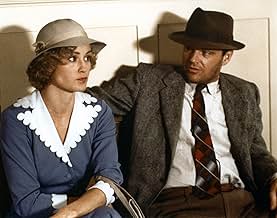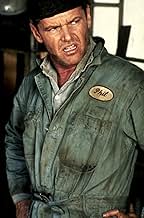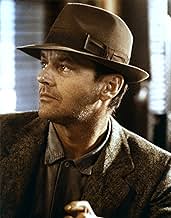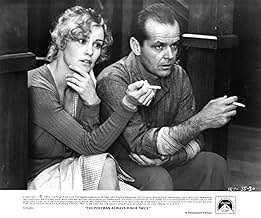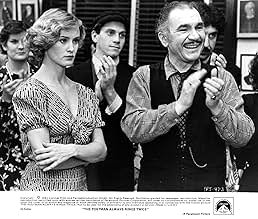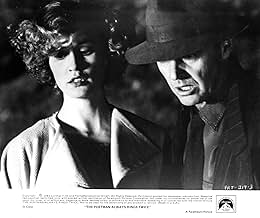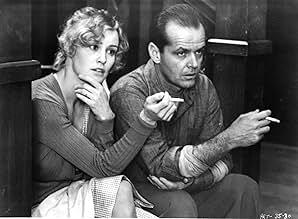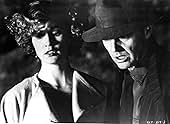Alors que la sensuelle épouse d'un propriétaire de camion-restaurant et un vagabond sans racines entament une liaison sordidement torride, ils conspirent pour assassiner son mari grec.Alors que la sensuelle épouse d'un propriétaire de camion-restaurant et un vagabond sans racines entament une liaison sordidement torride, ils conspirent pour assassiner son mari grec.Alors que la sensuelle épouse d'un propriétaire de camion-restaurant et un vagabond sans racines entament une liaison sordidement torride, ils conspirent pour assassiner son mari grec.
- Réalisation
- Scénario
- Casting principal
- Récompenses
- 1 victoire et 2 nominations au total
- Barlow
- (as Tom Hill)
Avis à la une
This is the base of the script, in which Jessica Lange and Jack Nicholson shine in their performances bringing different dimensions to their characters and, in true, bringing them to life.
Frank Chambers (Jack Nicholson) is a bored drifter, with some jail time under his belt not looking for anything in particular. He gets enchanted by Cora (Jessica Lange) and ends up doing everything for them to be together.
I think Jack Nicholson is an outstanding performer and it shows here some glimpses of what he will put in The Shining later on.
I also particularly liked John P. Ryan in the small supporting role of Kennedy where we can see in him the double-stabbing typical that he will show in later roles.
All in all it is a good movie, but I don't consider it as being erotic. Maybe for 1980's standards, but even so I doubt it.
Lange is indeed sexy and more closely fits the part of a lower-middle class woman who married an older man, a café owner, for security than the stunning blonde bombshell Lana Turner, who was frankly a little too gorgeous for the part. John Colicos plays the café owner, Nick Papadakis, with clear fidelity to Cain's conception. In the 1946 production, the part was played by Cecil Kellaway, who was decidedly English; indeed they changed the character's name to Smith. Also changed in that production was the name of the lawyer Katz (to Keats). One wonders why. My guess is that in those days they were afraid of offending Greeks, on the one hand, and Jews on the other. Here Katz is played by Michael Lerner who really brings the character to life.
Jack Nicholson's interpretation of Cain's antihero, an ex-con who beat up on the hated railway dicks while chasing any skirt that came his way, the kind of guy who acts out his basic desires in an amoral, animalistic way, was not entirely convincing, perhaps because Nicholson seems a little too sophisticated for the part. Yet, his performance may be the sort better judged by a later generation. I have seen him in so many films that I don't feel I can trust my judgment. My sense is that he's done better work, particularly in the two films mentioned above and also in Chinatown (1974), One Flew Over the Cuckoo's Nest (1975) and such later works as The Shining (1980) and Terms of Endearment (1983).
The problem with bringing Postman successfully to the screen is two-fold. One, the underlying psychology, which so strongly appealed to Cain's depression-era readership, is not merely animalistic. More than that it reflects the economic conflict between the established haves, as represented by the greedy lawyers, the well-heeled insurance companies, the implacable court system and the simple-minded cops, and to a lesser degree by property owner Nick Papadakis himself, and the out of work victims of the depression, the have-nots, represented by Frank and Cora (who had to marry for security). Two--and this is where both cinematic productions failed--the film must be extremely fast-paced, almost exaggeratedly so, to properly capture the spirit and sense of the Cain novel. Frank and Cora are rushing headlong into tragedy and oblivion, and the pace of the film must reflect that. A true to the spirit adaptation would require a terse, stream-lined directorial style with an emphasis on blind passions unconsciously acted out, something novelist Cormac McCarthy might accomplish if he directed film. I think that Christopher Nolan, who directed the strikingly original Memento (2000) could do it.
For further background on the novel and some speculation on why it was called "The Postman Always Rings Twice" (Cain's original, apt title was "Bar-B-Que") see my review at Amazon.com.
(Note: Over 500 of my movie reviews are now available in my book "Cut to the Chaise Lounge or I Can't Believe I Swallowed the Remote!" Get it at Amazon!)
Aside from an intriguing story, "The Postman Always Rings Twice" is a wonderfully put together film, as Rafelson does a splendid job delving into the characters and their relationships, as well as examining the problems associated with forbidden love. As a viewer, you truly feel the passion between Lange and Nicholson,(who both won academy award nominations), and you almost feel for their pain. In the 1930's women in America were at quite a different position than they are today. They were expected to stay with the husband no matter what the circumstances, as divorce was quite uncommon. Lange was very convincing as this trapped 30's woman who eventually broke free the only way she knew possible..
I definitely recommend "The Postman Always Rings Twice" for any fan of entertaining and thought-provoking movies. Although the character development is not quite as extensive as some of Rafelson's early work, particularly the 1971 classic "Five Easy Pieces", the movie combines an intriguing screenplay with superb acting to make its own statement.
The plot is simple in the extreme: the wife of a Greek man who runs his own diner, bored and neglected by her husband, begins a torrid affair with a drifter her husband employs as his mechanic. From there on in, the story gradually develops in often fascinating ways as the two lovers realise that only one thing's stopping their happiness: her husband.
The film is shot through with a grim and gritty emphasis, best realised by Nicholson's grubby mechanic. He's nobody's idea of a sex symbol, although Jessica Lange is quite ravishing as the object of his attentions. This focus on realism over Hollywood fantasy is what makes the film so watchable and, in places, uncomfortable as it becomes clear that the lovers have something of a sado-masochistic relationship.
Things move into courtroom-drama territory later on (featuring some terrific acting work from Michael Lerner as the lawyer) whilst handing a number of blink-and-you'll-miss-em minor parts to familiar faces (John P. Ryan as a blackmailer, Angelica Houston as - bizarrely - a circus owner, cult favourite Don Calfa as a circus hand, Brion James as a thug and Christopher Lloyd as a salsman).
I found the film to be sometimes compelling and never boring. It's one of those films you watch to find out just what happens to the central characters, a curiosity bolstered by the feeling that they're never going to unentangle themselves from this mess. Come the surprise climax, well...you'll have to see for yourself.
Le saviez-vous
- AnecdotesDavid Mamet's first screenplay.
- GaffesIn the final scene, after Cora dies and Frank sobs beside her body, you can clearly see Jessica Lange's chest move as she breathes.
- Citations
Cora: I gotta have you, Frank. If it was just us. If it was just you and me.
Frank Chambers: What are you talking about?
Cora: I'm getting tired of what's right and wrong.
Frank Chambers: They hang people for that, Cora.
- Versions alternativesCBS edited 30 minutes from this film for its 1986 network television premiere.
- ConnexionsEdited into American Cinema: Film Noir (1995)
Meilleurs choix
- How long is The Postman Always Rings Twice?Alimenté par Alexa
Détails
- Date de sortie
- Pays d’origine
- Langues
- Aussi connu sous le nom de
- El cartero siempre llama dos veces
- Lieux de tournage
- Barnsdall Rio Grande Service Station, Goleta, Californie, États-Unis(Cora and a Drunk Nick and Frank get Fuel)
- Sociétés de production
- Voir plus de crédits d'entreprise sur IMDbPro
Box-office
- Budget
- 12 000 000 $US (estimé)
- Montant brut aux États-Unis et au Canada
- 12 376 625 $US
- Montant brut mondial
- 12 383 416 $US


